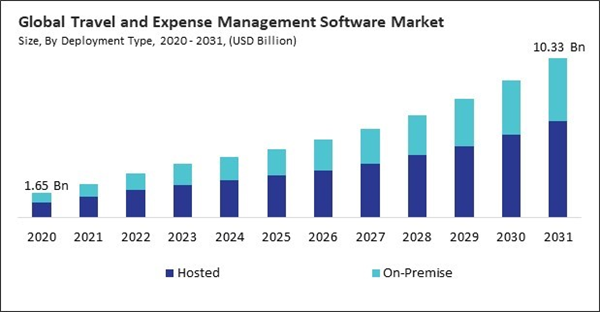IT firms often send employees across different locations for client meetings, international conferences, and project deployments, requiring real-time expense tracking, policy enforcement, and automated reimbursement workflows. The industry’s reliance on cloud-based solutions, AI-powered analytics, and seamless integration with ERP and HR systems further accelerates the adoption of travel and expense management software. Thus, the telecom & IT segment witnessed 20% revenue share in the market in 2023. Additionally, as IT companies expand their remote and hybrid work models, they require scalable, digital expense management solutions to track non-travel-related expenses such as software subscriptions and remote work reimbursements.
As organizations establish international partnerships, attend industry conferences, and explore new markets, managing travel-related expenses has become increasingly complex. Manual expense tracking is no longer viable, often leading to errors, reimbursement delays, and non-compliance with corporate policies.
Additionally, the shift from manual expense tracking to cloud-based and AI-powered solutions is revolutionizing business financial management. Cloud-based platforms allow employees to submit expenses from anywhere, reducing administrative workload and improving processing times. This transition ensures greater efficiency, enhanced policy enforcement, and a seamless expense reporting experience for employees and finance teams.
However, many businesses, especially those operating on tight budgets, find it challenging to allocate financial resources toward advanced expense management solutions. Unlike larger enterprises that can afford extensive automation, SMEs often hesitate to invest in such software due to concerns about high upfront costs and ongoing expenses. Hence, such concerns may hamper the growth of the market.
Driving and Restraining Factors
Drivers- Significant Rise in Corporate Travel
- Rising Adoption of Digital & Cloud-Based Solutions
- Growing Need for Expense Automation
- High Implementation and Maintenance Costs
- Substantial Data Security and Privacy Concerns
- Increasing Compliance & Regulatory Requirements
- Growing Mobile Workforce & Remote Work Trends
- Integration Challenges with Legacy Systems
- Lack of Awareness and Adoption in Emerging Markets
Deployment Outlook
Based on deployment type, the market is bifurcated into hosted and on-premise. The hosted segment garnered 62% revenue share in the market in 2023. The cost-effectiveness, scalability, and simplicity of integration with other enterprise systems are all factors contributing to the growing popularity of cloud-based expense management solutions.Enterprise Size Outlook
On the basis of enterprise size, the market is classified into large enterprises and SMEs. The SMEs segment recorded 43% revenue share in the market in 2023. Many SMEs operate on limited budgets and prefer cloud-based, subscription-based models that eliminate high upfront costs and provide flexibility. The increasing reliance on mobile expense reporting, AI-powered automation, and digital receipts has made expense management more accessible for SMEs, reducing manual errors and administrative burdens.Vertical Outlook
By vertical, the market is divided into telecom & IT, transportation & logistics, manufacturing, retail, government & defense, energy & utilities, healthcare, and others. The retail segment acquired 12% revenue share in the market in 2023. The retail sector is increasingly adopting travel and expense management software to efficiently manage supply chain operations, store expansions, and vendor collaborations.Regional Outlook
Region-wise, the market is analyzed across North America, Europe, Asia Pacific, and LAMEA. The Europe segment witnessed 31% revenue share in the market in 2023. Businesses in the region prioritize secure, cloud-based platforms with strong data encryption and automated policy enforcement to ensure compliance with regional tax laws and financial reporting standards.List of Key Companies Profiled
- Oracle Corporation
- SAP SE
- Infor, Inc.
- Coupa Software, Inc.
- Zoho Corporation Pvt. Ltd.
- Emburse, Inc. (Certify)
- Expensify, Inc.
- Navan, Inc.
- Ariett (AvidXchange)
- Rippling
Market Report Segmentation
By Deployment Type- Hosted
- On-Premise
- Large Enterprises
- SMEs
- Telecom & IT
- Transportation & Logistics
- Manufacturing
- Retail
- Government & Defense
- Energy & Utilities
- Healthcare
- Other Vertical
- North America
- US
- Canada
- Mexico
- Rest of North America
- Europe
- Germany
- UK
- France
- Russia
- Spain
- Italy
- Rest of Europe
- Asia Pacific
- China
- Japan
- India
- South Korea
- Australia
- Malaysia
- Rest of Asia Pacific
- LAMEA
- Brazil
- Argentina
- UAE
- Saudi Arabia
- South Africa
- Nigeria
- Rest of LAMEA
Table of Contents
Companies Mentioned
- Oracle Corporation
- SAP SE
- Infor, Inc.
- Coupa Software, Inc.
- Zoho Corporation Pvt. Ltd.
- Emburse, Inc. (Certify)
- Expensify, Inc.
- Navan, Inc.
- Ariett (AvidXchange)
- Rippling










